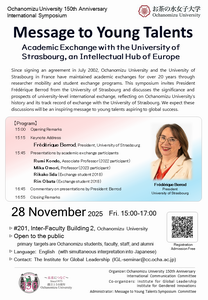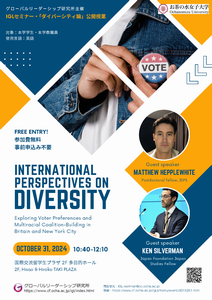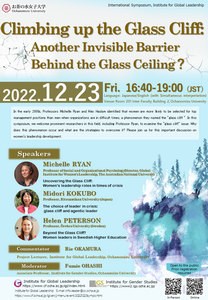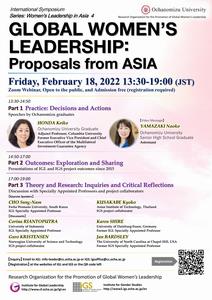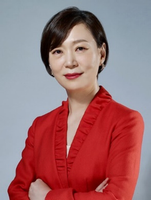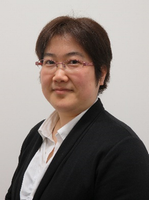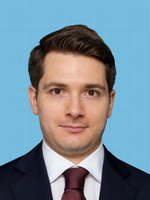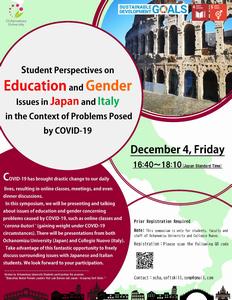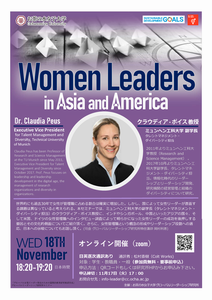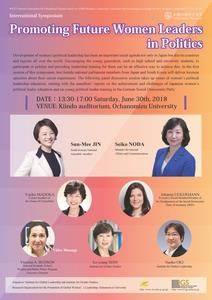ページの本文です。
EVENTS
2025年11月21日更新
Ochanomizu University 150th Anniversary International Symposium, Institute for Global Leadership (28 Nov. 2025)
Ochanomizu University 150th Anniversary International Symposium
“Message to Young Talents:
Academic Exchange with the University of Strasbourg, an Intellectual Hub of Europe”
(28 November 2025 Fri.)
Since signing an agreement in July 2002, Ochanomizu University and the University of Strasbourg in France have maintained academic exchanges for over 20 years through researcher mobility and student exchange programs. This symposium, commemorating Ochanomizu University's 150th anniversary, invites President Frédéric Berrod from the University of Strasbourg and focuses on international academic exchange based on inter-university collaboration.
In the 21st century, it has become increasingly common for university researchers to engage in global research and educational activities. On the one hand, such activities often depend on individual researchers' networks within their specific academic fields and pose challenges in terms of continuity. On the other hand, exchanges supported by institutional partnerships enable organizations to sustain frameworks for international research and education. Furthermore, Ochanomizu University in Japan, an island nation in East Asia, and the University of Strasbourg, located in a city bordering France and Germany at the heart of the EU, possess distinct social and cultural characteristics. The exchange between these two universities provides researchers and students with unique opportunities for experiencing different cultures and academic environments.
This symposium will discuss the significance and prospects of university-level international exchange, reflecting on Ochanomizu University's history and its track record of exchange with the University of Strasbourg. We expect these discussions will be an inspiring message to young talents aspiring to global success.
| Date and Time |
28 November 2025 Fri. 15:00–17:00 (Japan Standard Time) |
| Venue | 2F, Hisao & Hiroko TAKI PLAZA, Ochanomizu University ※Venue has been changed. |
| Target Audience | Open to the public (primary targets are Ochanomizu students, faculty, staff, and alumni) |
| Registration | Free admission, pre-registration required. Registration Form |
| Language | English (with simultaneous interpretation into Japanese) |
| Organizer | Ochanomizu University 150th Anniversary International Communication Committee |
| Co-organizers | Institute for Global Leadership, Institute for Gendered Innovations |
| Administrator | Message to Young Talents Symposium Committee |
| Contact | The Institute for Global Leadership IGL-seminar@cc.ocha.ac.jp |
Program
| 15:00 | Opening Remarks Masako Ishii-Kuntz (Trustee and Vice-President, Ochanomizu University) |
| 15:15 |
Keynote Address |
| 15:45 |
Presentations by academic exchange participants |
| Rumi Kondo (Associate Professor, Ochanomizu University) (2022 participant) | |
| Mika Omori (Professor, Ochanomizu University) (2023 participant) | |
| Rikako Iida (Exchange student 2018) | |
|
Rin Obata (Exchange student 2018) |
|
| 16:45 |
Commentary on presentations by President Berrod |
| 16:55 |
Closing Remarks |
Biographies of speakers

Frédérique Berrod is Professor of European Union Law at Sciences Po Strasbourg since September 2008. She is President of the University of Strasbourg since March 2025.
She is specialized in teaching European Union law (EU institutional law, internal market law, competition law, border law, energy law, health law, digital internal market law, and data law in Europe). Her researches focus on the European Energy Area, the European health products market, the digital internal market and borders in Europe. She has held a Jean Monnet Chair in "European Narratives of the Border" (NEFLAW) between 2021 and 2024.
Recently published: Chronique de droit du marché intérieur, Revue Trimestrielle de droit européen 2024.

■Rumi Kondo
Rumi Kondo is an Associate Professor of Faculty at Core Research Natural Sciences Division and an Assistant to the President at Ochanomizu University. She received her Ph.D. in Genetics from the Graduate University for Advanced Studies (SOKENDAI). Her field of expertise is evolutionary genetics. After postdoctoral research at the National Institute of Genetics and at Thomas Jefferson University in the USA, she teaches in the Department of Biology, the Life Sciences Course, and the Genetic Counseling Course at Ochanomizu University. She is also engaged in outreach activities at the Institute for Women’s Education in STEAM, supporting junior and senior high school students in choosing science-related career paths.
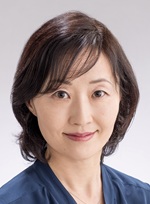
■Mika Omori
Mika Omori is a Professor at Faculty of Core Research Human Sciences Division at Ochanomizu University and Director of the Institute for Human Development and Education. She also serves as a Cross-Appointed Professor at Tohoku University. She holds a Ph.D. from Indiana University and was affiliated with the Faculty of Psychology at the University of Strasbourg. Her research focuses on health psychology, including eating behavior, body image, and health behavior promotion. Her publications include Mindful Eating (translation supervisor, Nippon Hyoron sya, 2020). She is a 2002 Abe Fellow and a 2016–2017 Fulbright Visiting Scholar.

■Rikako Iida
Rikako Iida graduated from the course of French Language and Culture, the department of Languages and Culture, Faculty of Letters and Education, Ochanomizu University. During her studies, she pursued French literature and languages and cultures of French-speaking regions. From 2018 to 2019, she was an exchange student at the Faculty of Arts at the University of Strasbourg, where she deepened her understanding of modern French literature. After graduation, she joined Japan Airlines as a flight attendant, serving on both domestic and international flights.

■Rin Obata
Rin Obata graduated from the course of French Language and Culture, the department of Languages and Culture, Faculty of Letters and Education, Ochanomizu University. She was enrolled in the Faculty of Educational Sciences at the University of Strasbourg from 2018 as an exchange student. Her primary area of interest and study is sociolinguistics. Currently, she works as a product manager at amptalk, the company developing a business meeting analysis service for sales teams.
関連ファイル / Related Files
»  sympo20251128(PDF形式 459キロバイト)
sympo20251128(PDF形式 459キロバイト)
PDFファイルの閲覧には、Adobe Acrobat Reader DC(新しいウインドウが開き、お茶の水女子大学のサイトを離れます)が必要です。
International Symposium, Institute for Global Leadership (Nov 15, 2024)
International Symposium
“Multicultural Coexistence and Development of Leadership under Globalization” (Friday, November 15, 2024)
The Institute for Global Leadership will be holding an international symposium as follows. This symposium will be held in a hybrid format, combining in-person and virtual involvement. We look forward to your participation.
| Date and Time |
Friday, November 15, 2024, 13:00-16:00 (Japan Standard Time) |
| Venue | 2F, Hisao & Hiroko TAKI PLAZA, Ochanomizu University 2-1-1 Otsuka, Bunkyo-ku, Tokyo |
| Contents | 【Title】 “Multicultural Coexistence and Development of Leadership under Globalization” 【Speakers】 Gracia Liu-Farrer (Waseda University) Helena Hof (University of Zurich) Hilary J. Holbrow (Indiana University) 【Opening Remarks】 |
| Language | English (with English-Japanese simultaneous interpretation) |
| Format |
Hybrid format (combining in-person and virtual involvement) |
| Target Audience | Students, faculty, and the general public (Free admission, first come, prior registration required. Registration Form ) |
| Contact | The Institute for Global Leadership info-leader@cc.ocha.ac.jp |
Program
| 13:00 | Opening Remarks Junko Nishimura (Professor, Director of the Institute for Global Leadership, Ochanomizu University) |
|
| 13:05 |
Speaker Introduction |
|
| 13:10 | Presentations(Click here for detail.) | |
| Helena Hof (Senior Research and Teaching Fellow, University of Zurich) | “Gender Dynamics in high-tech startups: An intersectional perspective on leadership in transnational entrepreneurship” | |
| Hilary J. Holbrow (Assistant Professor, Indiana University) | “(In)visible Inequalities: Gender and Immigrant Background in Elite Japanese Firms” | |
| Gracia Liu-Farrer (Professor, Waseda University) | “Immigration, the identity-binary and the future of Japan” | |
| 15:10 |
Panel Discussion Q&A |
|
| 15:55 |
Closing Remarks |
|
Biographies of speakers
■Helena Hof
■Hilary J. Holbrow
関連ファイル / Related Files
»  sympo20241115(PDF形式 10,460キロバイト)
sympo20241115(PDF形式 10,460キロバイト)
PDFファイルの閲覧には、Adobe Acrobat Reader DC(新しいウインドウが開き、お茶の水女子大学のサイトを離れます)が必要です。
IGL Seminar “International Perspectives on Diversity: Exploring Voter Preferences and Multiracial Coalition-Building in Britain and New York City”(Oct 31, 2024)
IGL Seminar & "Diversity Management" Open Lecture
This lecture considers diversity from an international perspective. It comprises two parts. The first explores Western voters’ preferences towards the sociodemographic characteristics of politicians. It charts the results of various experimental studies and electoral data, before presenting the results of an original experiment conducted in Britian. This experiment finds that Britons are not being represented by the kind of politicians they desire. It considers the questions this raises, from whether democracy can be said to be operating in Britain to whether the record high level of disillusionment and record low levels of turnout in Britain can be explained by this mismatch between the wishes of voters and the reality with which they are faced. The second part comprises a case study. As an ethnically and linguistically super-diverse urban polity, the New York City borough of Queens represents an ideal laboratory for studying multiracial coalition-building. As the machine politics domination of European-origin late-generation ethnics (LGEs) recedes, and post-1965 immigrant-origin candidates enter the political arena, “new majority candidates,” who must mobilize their multiple identities and build multiracial coalitions to achieve electoral victories, have reinvigorated US politics. Analyzing block level voting data from the 2021 New York City Council race in one of Queens’ most diverse and fastest-growing districts, this study examines the surprising election of a Korean American candidate, Julie Won, in a district that is not Korean- or even Asian-dominated. We contend that Won’s victory can be attributed to three key factors: 1) her positionality as a new majority candidate; 2) her balanced, pluralist messaging and strategic framing; and 3) her appeal to a broad coalition of voters through hyper-local and cross-cutting issues.
- Date and Time: Thursday, October 31, 2024, 10:40-12:10
- Venue: 2F, Hisao & Hiroko TAKI PLAZA, Ochanomizu University
2-1-1 Otsuka, Bunkyo-ku, Tokyo - Speakers: Matthew Hepplewhite (Oxford University)
Ken Silverman (The City University of New York) - Title: “International Perspectives on Diversity: Exploring Voter Preferences and Multiracial Coalition-Building in Britain and New York City”
- Language: English
- Target Audience: Students and faculty of Ochanomizu University (Free admission, no prior registration required)
- Contact: The Institute for Global Leadership (IGL-seminar@cc.ocha.ac.jp)
Biography
Matthew Hepplewhite
Matthew is studying for PhD at Oxford University and a Japan Society for the Promotion of Science at the University of Tokyo. He researches the kind of people (in terms of sociodemographic characteristics, with a particular focus on education, former occupation, and class) who act as politicians and tests whether they are the kind of people whom voters want to act as their representatives. He also researches what politicians publicise – and don’t publicise – about themselves with regard to the sociodemographic characteristics listed above.
Ken Silverman
Ken Silverman is a PhD candidate in Political Science at the City University of New York (CUNY). He was recently named a Japan Foundation Japan Studies Fellow and appointed Visiting Research Fellow at the University of Tokyo’s Institute of Social Science, where he is conducting research on Japan’s second-generation immigrants for his doctoral dissertation. Prior to receiving his Master of International Affairs from CUNY Baruch College, he was an award-winning Senior News Producer at the New York Bureau of Fuji TV Network for over a dozen years.
<ONLINE> International Symposium, Institute for Global Leadership (Dec 23, 2022)
International Symposium
“Climbing up the Glass Cliff: Another Invisible Barrier Behind the Glass Ceiling?” (Friday, December 23, 2022)
Abstract:
Although the number of women in leadership positions in Japan is increasing, especially with the efforts of the government to realize a society where men and women alike take on leadership roles, the ratio of women in the top management in Japan is negligible compared with other countries.
Today, many of us are familiar with the concept of the glass ceiling, which are invisible barriers that keep women from leadership positions. In contrast, we witness talented women leaders worldwide in a time of crisis, proving that women can lead organizations as effectively as men.
In the early 2000s, Professors Michelle Ryan and Alex Haslam explored the phenomenon that women are more likely to be selected to top management during times of crisis or downturn. This appointment may be unstable, and the risk of failure is higher. They named this phenomenon “the glass cliff.” Evidently, this type of leadership environment is unsuitable for fostering female leaders. The Institute for Global Leadership, Ochanomizu University, takes the opportunity to explore this subject with distinguished researchers in this field. By discussing the underlying fundamental problems of the glass cliff and prospects for the strategy to overcome it, we aim to contribute to women’s leadership. We invite you to join this inspiring discussion where the focus will be on women’s leadership education.
- Date and Time: Friday, December 23, 2022 16:40-19:00 (Japan Standard Time)
- Venue: Zoom Webinar and Offline (Inter-Faculty Building 2-201)
- Simultaneous interpretation available (English/Japanese)
- Audience: Open to the public
- Prior registration required: Registration Form Webinar, Offline(Registration closed.)
Program
| Opening Remarks 16:40-16:45 | |
|
Yoko Totani, Professor, Director of Institute for Gender Studies, Ochanomizu University |
|
| Introduction of the Speakers 16:45-16:50 | |
| Makoto Kobayashi (Professor, Director of Institute for Global Leadership, Ochanomizu University) | |
| Presentations 16:50-18-30 (30 minutes for each presentation)(Click here for detail.) | |
|
Ryan Michelle, Professor, Director of Global Institute for Women's Leadership, The Australian National University |
“Uncovering the Glass Cliff: Women’s leadership roles in times of crisis” |
| Midori Kokubo, Professor, Ritsumeikan University (Japan) | “The choice of leader in crisis – glass cliff and agentic leader” |
| Helen Peterson, Professor, Örebro University (Sweden) | “Beyond the Glass Cliff? Women leaders in Swedish Higher Education” |
| Comment 18:30-18:40 | |
| Rie Okamura, Project Lecturer, Institute for Global Leadership, Ochanomizu University | |
| Q&A 18:40-18:55 | |
| Closing Remarks 18:55-19:00 | |
| Masako Ishii-Kuntz (Trustee and Vice President of Ochanomizu University) | |
Moderator: Fumie Ohashi, Associate Professor, Institute for Gender Studies, Ochanomizu University
Biographies of the speakers
■Midori Kokubo, Professor, Ritsumeikan University
■Helen Peterson, Professor, Örebro University
関連ファイル / Related Files
»  sympo20221223(PDF形式 835キロバイト)
sympo20221223(PDF形式 835キロバイト)
PDFファイルの閲覧には、Adobe Acrobat Reader DC(新しいウインドウが開き、お茶の水女子大学のサイトを離れます)が必要です。
<ONLINE> International Symposium (Feb 18, 2022)
International Symposium
“Global Women’s Leadership: Proposals from Asia” (Friday, Feb 18, 2022)
Series: Women's Leadership in Asia 4
Almost seven years ago, the Ochanomizu University established the Research Organization for the Promotion of Global Women’s Leadership (GWL) in April 2015. Aimed at presenting our achievements in research and educational activities since 2015, we are hosting an international symposium entitled “Global Women’s Leadership: Proposals from Asia.” Coincidentally, this is the last symposium in the 2021 symposia series of “Women’s Leadership in Asia.” This symposium comprises presentations of the educational programs and research findings by the scholars belonging to the Institute for Global Leadership (IGL) and the Institute for Gender Studies (IGS), both housed under the GWL. Based on these findings, we will discuss women’s leadership in Asia from global and diverse perspectives. In addition to those scholarly debates, we will hear perspectives on women’s leadership from women leaders in Asia, who are Ochanomizu graduates active on the global stage.
Co-organized by the IGL and the IGS, this symposium will offer participants the opportunity to learn through stimulating discourses and exploratory debates that criticize the celebration of the superficial diversification of leadership. The symposium attempts to transcend gender stereotypes and undertakes the university’s aim of developing future women leaders. We hope you will join our discussions to develop the concepts of women’s leadership.
| Date and Time |
Friday, February 18, 2022, 13:30-19:00 (JST & KST), |
| Venue | Zoom Webinar (Prior registration required) (Registration closed.) |
| Language | English and Japanese with simultaneous interpreting |
| Audience | Open to the public |
| Organizer |
Research Organization for the Promotion of Global Women’s Leadership, Ochanomizu University |
| Inquiry | IGL: info-leader@cc.ocha.ac.jp IGS: igsoffice@cc.ocha.ac.jp |
Program
| Opening (13:30-13:40) | |||
|
MC: HOGETSU Rie (IGL Project Lecturer) |
|||
| Part 1 Practice: Decisions and Actions (13:40-14:40) | |||
|
《Speeches by Ochanomizu Graduates》 HONDA Keiko (Adjunct Professor, Columbia University/Former Executive Vice President and Chief Executive Officer of the Multilateral Investment Guarantee Agency) [Ochanomizu University Graduate] YAMAZAKI Naoko (Astronaut) [Ochanomizu University Senior High School Graduate]【Video Message】 |
|||
| Break (14:40-14:50) | |||
| Part 2 Outcomes: Exploration and Sharing (14:50-16:40) | |||
|
《Presentations of IGL and IGS project outcomes since 2015》 Presenters Facilitator |
|||
| Break (16:40-17:00) | |||
| Part 3 Theory and Research: Inquiries and Critical Reflections (17:00-19:00) | |||
|
《Discussion with Specially Appointed Professors and project Collaborators》 Keynote Speakers KUSAKABE Kyoko (Professor, Asian Institute of Technology, Thailand) [IGS project collaborator] Discussants Moderator: OHASHI Fumie (IGS Associate Professor) Closing Remarks: TOTANI Yoko |
|||
[Speaker]
Part 1

■HONDA Keiko (Speech in the Part 1)
Keiko Honda is Adjunct Professor and Adjunct Senior Research Scholar of Columbia University’s School of International and Public Affairs, where she teaches ESG Investing to graduate students. Honda also serves as a board member of Mitsubishi UFJ Financial Group and AGC (ex Asahi Glass), a member of the United Nation’s Investment Management Committee, a member of Singapore’s the Asia Sustainable Infrastructure Advisory Panel and a member of Japanese Financial Services Agency’s Policy Assessment Committee. Until 2019, She was the CEO of the Multilateral Investment Guarantee Agency (MIGA), the political risk insurance and credit enhancement arm of the World Bank Group. MIGA supports cross-border equity investors and lenders by providing coverage against political risk and non-honoring of financial obligations. Before joining MIGA, Honda was the first woman Senior Partner in Asia at McKinsey & Company, where she advised clients on corporate finance and strategy and business development for 24 years. Honda received the Joseph Wharton Social Award from the Wharton New York Club in 2020. Honda holds a bachelor’s degree from Ochanomizu University and an MBA from the University of Pennsylvania’s Wharton School, where she was selected as a Fulbright Scholar.

■YAMAZAKI Naoko (Video message in the Part 1)
Naoko Yamazaki is Astronaut. She earned a Master of Engineering degree majored in Aerospace Engineering from the University of Tokyo in 1996, then started working for current Japan Aerospace Exploration Agency (JAXA). In 1999, she was selected as an astronaut candidate and was qualified as a Soyuz-TMA Flight Engineer in 2004 and NASA Mission Specialist in 2006. On April 5, 2010 Yamazaki was onboard Space Shuttle Discovery on the crew of STS-131, an assembly & resupply mission to the International Space Station. After retiring from JAXA in 2011, Yamazaki has been serving as a member of the Committee on National Space Policy, the Cabinet Office of Japan, and devoting herself to space education as a president of Young Astronaut Club and a chairperson of “Sorajo (women in aerospace)” under Japanese Rocket Society. Yamazaki co-founded Space Port Japan Association in 2018 and is serving as its representative director. Yamazaki also joined in Council of the Earthshot Prize in 2020 to inspire a decade of action to repair the planet.

■HOGETSU Rie (MC in the Part 1)
Rie Hogetsu is Project Lecturer at the Institute for Global Leadership, Ochanomizu University. Dr. Hogetsu is a medical sociologist, and her research focuses on health, professions, and family in modern Japan. She has published a book, Kindai Nihon niokeru Eisei no Tenkai to Juyō (Tōhisndō, 2010), as well as journal articles and book chapters.
Part 2
IGL

■KOBAYASHI Makoto (Presenter in the Part 2)
Makoto KOBAYASHI is Professor at the Graduate School of Humanities and Sciences and Director of the Institute for Global Leadership at Ochanomizu University. His specialty is Political Science, Peace Studies, and International Relations. He has investigated social formation of the state in the era of globalization, especially putting focus on the concept of political power, public-private relation and the control of violence.

■OKAMURA Rie (Presenter in the Part 2)
Dr. Okamura holds a Ph.D. degree from Ochanomizu University in sociology, specializing in family sociology. Her women's leadership research project, in which she serves as principal investigator, is supported by the Japan Society for the Promotion of Science under the KAKEN Grant-in-Aid for Early-Career Scientists (2020-2023).

■NAITO Akie (Presenter in the Part 2)
Dr. Akie NAITO is Project Lecturer at the Institute for Global Leadership at Ochanomizu University. She is in charge of the development of an index to measure the effect of leadership education and teaches classes to improve students' leadership skills.
IGS

■TOTANI Yoko (Presenter in the Part 2)
Yoko Totani is Professor at the Graduate School of Humanities and Sciences and Director of the Institute for Gender Studies at Ochanomizu University. She holds an M.F.A. in theatre criticism and dramaturgy from Columbia University. While a graduate student at Columbia, she worked on Japanese traditional/contemporary theatre productions such as Kabuki, Bunraku, and Noh, as well as Japanese avant-garde theatres performing in New York City. She also worked as an assistant to the avant-garde theatre director/playwright Lee Breuer and his company Mabou Mines. Her essays, which appear in academic journals and other publications, mainly center on theatre and performance, cultural politics, and playwrights such as Gertrude Stein, Tennessee Williams, Sam Shepard, and Maria Irene Fornes. She co-authored books which include Keywords of Performance Studies: An Introduction to Critical Cultural Studies (Sekaishisosha, 2011).

■SHIN Ki-young (Presenter in the Part 2)
Ki-young Shin is Professor in the Graduate School of Humanities and Sciences and the Institute for Gender Studies at Ochanomizu University. Ph.D. in Political Science. Her research interests include women’s political representation, comparative women’s movements, #MeToo, and gender policies in East Asia. She organized an East Asian Research Network on Gender and Diversity in Political Representation (WondeR) for comparative research on women’s political representation in Japan, Korea, and Taiwan. In 2018, she co-founded the Academy for Gender Parity for women’s political leadership education. She has published a book, Gender and Power (Palgrave McMillan, 2015), as well as Japanese and Korean books.

■SEMBA Yukari (Presenter in the Part 2)
Yukari Semba is Project Lecturer at the Institute for Gender Studies at Ochanomizu University. Ph.D. in Human Sciences. Her research focuses on bioethics and gender studies. She explicitly addresses ethical and gender issues related to assisted reproductive technology. She has published a book, Chi no Tsunagari wo Koete: Teikyo Seishi, Teikyo Randhi, Yoshi de Dekita Kazoku no Monogatari (Ningen to Rekishi sha, 2020), and two book chapters (11 & 12) in Comparative Perspectives on Gender Equality in Japan and Norway(Routledge, 2021)as well as journal articles and other book chapters.

■HIRANO Keiko (Presenter in the Part 2)
Keiko Hirano is Project Lecturer at the Institute for Gender Studies at Ochanomizu University. Ph.D. in Social Science/Gender and Development. She specializes in Transnational Sociology, Gender studies, and Indonesian Area Studies. Her recent works are “Thinking about ‘home economics’ from the phase of paid domestic work” in Gendai Shisou (Modern Thoughts) (Seidosha, 2022), and a book chapter in Transnational Sociology of Domestic Work: In Quest of Decent Work (Ruri ITO ed., Jimbun Shoin, 2020).
Part 3

■OHASHI Fumie (Moderator in the Part 3)
Fumie Ohashi is Associate Professor in the Graduate School of Humanities and Sciences and the Institute for Gender Studies, Ochanomizu University. Her research interests focus on gender and migration in the reproductive sphere of Mainland China, Hong Kong, and Chinese-speaking communities in Japan. Currently, she is working on the labor relations and labor movements of migrant and local domestic workers in Hong Kong. She is also interested in transnational and translocal women’s activisms in East Asia. She had published a book, Migrant Domestic Workers in Contemporary China: The Politics of Reproductive Labor in Rural-Urban Relations (Ochanomizu Shobo, 2011), as well as journal articles and book chapters.
関連ファイル / Related Files
»  sympo20220218(PDF形式 1,271キロバイト)
sympo20220218(PDF形式 1,271キロバイト)
PDFファイルの閲覧には、Adobe Acrobat Reader DC(新しいウインドウが開き、お茶の水女子大学のサイトを離れます)が必要です。
<ONLINE> International Symposium, Institute for Global Leadership (Dec 16, 2021)
“Challenges and Key Empowerment Strategies for Women Leaders in India and Indonesia” (Thursday, December 16, 2021)
Out of 156 countries, the rank of gender gap report for Indonesia is 101st, for Japan is 120th and for India is 140th (World Economic Forum, 2021), indicating there are many challenges to improve women’s participation in these countries. Women are facing many difficulties to embrace their identity as leaders and to gain acceptance as leaders by others. While many has addressed this issue, less people realize that the development of identity as leaders start early in life, where women learn to appreciate their identities as leaders and as caregivers (as a wife and/or a mother). This symposium is going to present research findings in India and Indonesia related to challenges and key empowerment strategies for the development of women leaders in those two big countries, with many diversities within each country. The role of family (especially a father), culture, education and mentor will be specifically discussed.
- Date and Time:Thursday, December 16, 2021
9:00-11:00 (Japan Standard Time [Tokyo, Japan])
7:00-9:00 (Western Indonesian Time [Jakarta, Indonesia])
12.15 Wed. 19:00-21:00 (Eastern Standard Time [Philadelphia, USA]) - Online Symposium (via Zoom Webinar)
- Simultaneous interpretation available (English/Japanese)
- Audience: Open to the public
- Prior registration required Registration Form (Registration closed.)
Program
| Opening 9:00 - 9:05 | ||
| Moderator: Dr. Kyoko Motobayashi | ||
| Opening remarks 9:05 - 9:15 | ||
|
Dr. Masako Ishii-Kuntz (Trustee and Vice President of Ochanomizu University) |
||
|
Mrs. Nuning Akhmadi (Spouse of the Indonesian Ambassador to Japan) |
||
| Break 9:15 - 9:20 | ||
| Presentations 9:20 - 10:20 (Click here for detail.) | ||
| Dr. Rajashi Ghosh | “Challenging the Gendered Norms of Leadership: Implications for Indian Women Leaders” | |
| Dr. Risatianti Kolopaking |
“Posyandu Cadre: Empowering Indonesian Women Leaders in Community-based Healthcare” |
|
| Dr. Nurtami Soedarsono | “Women in Higher Education: Leading across Disciplines and Cultures” | |
| Discussant 10:20 - 10:35 | ||
|
Dr. Corina Riantoputra |
||
| Q&A 10:35 - 10:55 | ||
| Floor & Moderator | ||
| Closing 10:55 - 11:00 | ||
| Dr. Kyoko Motobayashi | ||
Biographies of the speakers
|
■Rajashi Ghosh- Associate Professor, School of Education, Drexel University, USA Dr. Rajashi Ghosh is Associate Professor and the Department Chair for Policy, Organization and Leadership in the School of Education, Drexel University in USA. She has publications in many reputable journals and now is an editor of Human Resource Development International (HRDI). She is going to share her research on women leaders in India. ■Risatianti Kolopaking- Lecturer, Faculty of Psychology, Islamic State University Syarif Hidayatullah, Indonesia Dr. Risatianti Kolopaking is a lecturer from the oldest Islamic University in Indonesia. She conducts many research and consulting works in health industry, and currently, participates in international research about stunting in India, Indonesia and Nepal. She is going to share her observation of women leaders in a health setting, in rural Indonesia. ■Nurtami Soedarsono- Lecturer, Faculty of Dentistry / Vice Rector for Research, Innovation and Community Engagement Universitas Indonesia, Indonesia Dr. Nurtami Soedarsono received her Ph.D., from Tokyo Medical and Dental University. She is one of the youngest Vice Rectors (Vice President) in Indonesia, and is now serving as Vice Rector for Research, Innovation and Community Engagement at Universitas Indonesia. She is going to share her own experience to be a woman leader in an educational setting. |
Discussant:
■ Dr. Corina D. Riantoputra, Specially-Appointed Professor, Institute for Global Leadership, Ochanomizu University, Japan / Associate Professor, the Faculty of Psychology, Universitas Indonesia, Indonesia
Moderator:
■ Dr. Kyoko Motobayashi, Associate Professor, Institute for Global Leadership, Ochanomizu University
関連ファイル / Related Files
»  sympo20211216(PDF形式 1,214キロバイト)
sympo20211216(PDF形式 1,214キロバイト)
PDFファイルの閲覧には、Adobe Acrobat Reader DC(新しいウインドウが開き、お茶の水女子大学のサイトを離れます)が必要です。
Presidents’ Conference Ochanomizu × Ewha “Tomorrow: Vision for Fostering Global Women Leaders” (December 1, 2021)
Presidents’ Conference Ochanomizu × Ewha
“Tomorrow: Vision for Fostering Global Women Leaders”
Through their histories, both Ewha Womans University in Korea and Ochanomizu University in Japan have played a pivotal role in educating women who became pioneers in all walks of life.
Today, we are faced with a new and unfamiliar world. We hope to work together to create new opportunities in the midst of great challenges that lie before us. With our long history of overcoming challenges and creating new pathways for women and the world, we will boldly move forward.
Both Ewha and Ochanomizu universities will continue our proud legacy and take our endeavor to the next level to produce a corps of professionals who will assume leadership —both at the national and global level.
As the first step forward to work together for the development of higher education for women into the future, presidents of Ewha and Ochanomizu universities will share their visions of education for women and strategies for challenges that we face.
- Date and Time:Wednesday, December 1, 2021, 15:00-17:15 (Japan Standard Time)
- Online Symposium (via Zoom Webinar)
- Simultaneous interpretation available (English/Japanese)
- Audience:Open to the public
- Prior registration required Registration Form (Registration closed.)
Program
|
Time |
Program |
Speaker |
|---|---|---|
|
15:00-15:05 |
Opening Remarks |
Masako ISHII-KUNTZ, Trustee/Vice President of Ochanomizu Univ. |
|
15:05-15:25 |
Introducing Presidents & Universities |
Makoto KOBAYASHI, Director of Institute for Global Leadership, Ochanomizu Univ. |
|
15:25-16:15 |
Keynote Speeches by Presidents |
President Eun Mee KIM |
|
16:15-16:30 |
Questions & Comments from Students |
Students of Ewha and Ochanomizu |
|
16:30-16:45 |
Response from the Presidents |
President Eun Mee KIM |
|
16:45-17:00 |
Message from Woman Leader |
Kathy MATSUI, General Partner, MPower Partners |
|
17:00-17:10 |
Final Words by the Presidents |
President Eun Mee KIM |
|
17:10-17:15 |
Closing Remarks |
Sung-Nam CHO, Professor Emeritus, Ewha Womans Univ., Specially Appointed Professor, Ochanomizu Univ. |
Biographies
|
■Eun Mee Kim, President, Ewha Womans University Professor Eun Mee Kim is the 17th President of Ewha Womans University. She completed her M.A. in Sociology at Brown University after graduating from Ewha Womans University and received her Ph.D. in Sociology at Brown University. She is Professor in the Graduate School of International Studies, Director of the Ewha Global Health Institute for Girls and Women, former Dean of the Graduate School, former Dean of the Graduate School of International Studies, and former Director of the Institute for Development and Human Security at Ewha Womans University. She became the President of Ewha Womans University in March 2021. ■Yasuko SASAKI, President, Ochanomizu University Yasuko SASAKI is the 17th President of Ochanomizu University. She graduated from Ochanomizu University with a degree in Japanese linguistics. After receiving Master of Japanese Literature and Master of Humanities and Sciences from Ochanomizu University, she served as an Assistant Professor and later as an Associate Professor in the Faculty of Letters and Education, Ochanomizu University, and became a professor in 2007. She was a Visiting Professor at Université de Strasbourg, France. Following positions as Vice President and Trustee for international affairs and gender equality, she became the President of Ochanomizu University in April 2021. ■Kathy MATSUI, General Partner, MPower Partners Kathy is the former Vice Chair of Goldman Sachs Japan and Chief Japan Equity Strategist. Her groundbreaking ʻWomenomicsʼ research spurred the Japanese government to promote gender diversity, and she has advised corporations on governance and diversity best practices. She has an MA from Johns Hopkins School of Advanced International Studies and an AB from Harvard. |
関連ファイル / Related Files
»  Presidents’Conference20211201(PDF形式 7,317キロバイト)
Presidents’Conference20211201(PDF形式 7,317キロバイト)
PDFファイルの閲覧には、Adobe Acrobat Reader DC(新しいウインドウが開き、お茶の水女子大学のサイトを離れます)が必要です。
<ONLINE> International Symposium (Nov 15, 2021)
International Symposium
“Leadership for All: Theory and Action to Foster Gender Equality” (Monday, Nov 15, 2021)
Series: Women's Leadership in Asia 1
The general elections in Japan in October 2021 must elicit in-depth discussions on gender equality and women’s leadership in politics. The current proportion of women in Japan’s House of Representatives is only 10%, even after more than seven decades have passed since universal suffrage was established. Why is the representation of women in the Japanese Diet so small? This gender gap in number reveals the existence of a gender gap in politics in a broader context. What barriers prevent the participation of women participation in Japanese politics? What must be accomplished to make women more interested and involved in politics? This symposium will discuss women’s leadership in politics from a global perspective, beginning with an academic discussion on the gender gap in political participation in the UK.
This symposium is co-organized by the Institute for Global Leadership (IGL) and the Institute for Gender Studies (IGS) at Ochanomizu University. It will offer participants the opportunity of learning through stimulating discourses and exploratory debates that criticize the celebration of the superficial diversification of leadership. The symposium will attempt to transcend gender stereotypes and undertake the university’s aim to develop future women leaders. We hope you will join our discussions to develop the concepts of leadership.
- Date and Time:Monday, November 15th, 2021, 18:00-20:00 (JST), 9:00-11:00 (GMT)
- Venue:Zoom Webinar (Prior registration required) Registration (Registration closed.)
- Language:Japanese and English with simultaneous interpreting
- Organizer:Research Organization for the Promotion of Global Women’s Leadership
[Institute for Global Leadership (IGL) and Institute for Gender Studies (IGI)]
Program
|
MC: TOTANI Yoko (Professor and IGS Director, Ochanomizu University) |
|||
| Opening remarks and introduction (18:00 - 18:05 JST, 9:00 - 9:05 GMT) | |||
| ISHII-KUNTZ Masako (Vice President and Trustee, Ochanomizu University) | |||
| Session 1: Keynote Speech (18:05 - 18:55 JST, 9:05 - 9:55 GMT) | |||
|
“Understanding women's political participation: a case study of the United Kingdom” |
|||
| Break (18:55 - 19:00 JST, 9:55 - 10:00 GMT) | |||
| Session 2: Panel Discussion (19:00 - 20:00 JST, 10:00 – 11:00 GMT) | |||
|
Rosie CAMPBELL SHIN Ki-young (Professor, IGS, Ochanomizu University) OKI Naoko (Lecturer, Sugiyama Jogakuen University, IGL Visiting Researcher) Myles CARROLL (Assistant Professor, IGL Researcher, Ochanomizu University) [Moderator] KOBAYASHI Makoto (Professor, IGL Director, Ochanomizu University) |
|||
[Keynote Speech]
“Understanding women's political participation: a case study of the United Kingdom”
Rosie Campbell
In most established democracies women's participation in politics has increased over the decades that have followed suffrage, but gender gaps remain. Women's electoral turnout has largely caught up with men's and in some contexts overtaken it. However, women remain less likely to be actively interested and engaged in politics, less likely to be party members, and less often stand for political office, although again many of these differences have diminished over time. Alongside this gradual increase in women's political participation, we have seen gender gaps in party support emerge with women in many high-income countries shifting to the left of men. In this paper I explore the barriers and enablers to women's political participation in the UK within in the context of the global literature. I ask whether increasingly hostile online political environments are likely to supress women's participation or whether distinct gendered political values are emerging that support women's political activity.
[Speaker]
■Rosie Campbell
Rosie Campbell is professor of politics and director of the Global Institute for Women’s Leadership(GiWL) at King’s College London. The Institute works towards a world in which women of all backgrounds have fair and equal access to leadership. Chaired by Julia Gillard, the only woman to have served as Prime Minister of Australia, the GiWL brings together rigorous research, practice and advocacy to break down the barriers to women becoming leaders, while challenging ideas of what leadership looks like.
Rosie has written extensively on political representation and is the principal investigator of the ESRC funded Representative Audit of Britain, which surveyed all candidates standing in the 2015, 2017 and 2019 British General Elections. She has presented six episodes of Radio Four’s Analysis and in 2020 she presented an episode of BBC Radio 4’s rethink series examining how COVID19 is accelerating changes to our world that were not expected until at least 2025.
[Discussants]
■SHIN Ki-young
Shin Ki-young is Professor of Political Science and Gender Studies at Ochanomizu University. Research interests include women’s political representation, comparative women’s movements, #MeToo, and gender policies in East Asia. Organizer of the East Asian Research Network on Gender and Diversity in Political Representation (WondeR) for comparative research on women's political representation in Japan, Korea, and Taiwan. Recent works are published in international journals including International Political Science Review, Politics & Gender, and Pacific Affairs, as well as numerous edited books.
■OKI Naoko
Oki Naoko is Lecturer at Sugiyama Jogakuen University and Visiting Researcher, Institute for Global Leadership, Ochanomizu University. She received her Ph. D. in Gender and Politics in 2011. From 2018 she is the principal investigator of the research project "Seiji Juku” (Politics Academies) in the Candidate Recruitment Process: Implications for Women's Political Participation" of Grant-in-Aid for Scientific Research (C), JSPS. Her recent works on academic journals are "Promoting Women's Participation in Local Election by Political Party Candidate Recruitment: A Case of Prefectural Assemblies in Japan" (2016), "Do the Seiji Juku (Politics Schools) Promote Women's Political Participation in Japan?: An Examination of their Recruitment Systems" (2018), and “Recruitment of Female Candidates by Political Parties: Analysis of the Nation-wide Local Election in 2019” (2019). Her current research interests include women participation in local politics and political recruitment.
■Myles CARROLL
Myles Carroll is an Assistant Professor in the divisions of Global Studies for Intercultural Cooperation and Gender and Social Science and Researcher at the Institute for Global Leadership, Ochanomizu University. His research examines the political economy of Japan, using social reproduction theory and Gramscian hegemony theory to explore Japanese political economy from the post-war era to the present from a critical and feminist perspective. He teaches in the areas of international political economy and labor economics at the undergraduate level and comparative political economy and gender political economy at the graduate level. He has published articles in various journals, including The Japanese Political Economy, Capital & Class and Critical Sociology, and will publish a book, The Making of Modern Japan: Power, Crisis, and the Promise of Transformation in November 2021.
関連ファイル / Related Files
»  sympo20211115(PDF形式 1,779キロバイト)
sympo20211115(PDF形式 1,779キロバイト)
PDFファイルの閲覧には、Adobe Acrobat Reader DC(新しいウインドウが開き、お茶の水女子大学のサイトを離れます)が必要です。
<ONLINE> International Symposium, Institute for Global Leadership (June 26, 2021)
“Cross-Cultural Diversity in Leadership Styles” (Saturday, June 26, 2021)
In what ways can we recognize diversity in leadership styles within our globalizing society, where we cannot neglect the linguistic, cultural and individual differences in our daily lives? How can we recognize such diversity in meaningful ways, beyond a superficial celebration of the diversity of leaders and oversimplified and stereotyped images of leaders and leadership?
This symposium, hosted by the Institute for Global Leadership at Ochanomizu University, provides a forum to discuss these issues, focusing on cross-cultural diversity in leadership styles.
Our speakers are: Professor Doris Schedlitzki, a specialist on leadership research and whose recent work includes studies on the ways of leading in non-anglophone countries; Professor/President Cecilia Gascon, current President of Bulacan State University and former President of the Southern Luzon State University, who holds more than 10 years of experience as a University President in the Philippines; and Professor Makoto Kobayashi, Director of the Institute for Global Leadership at Ochanomizu University.
This symposium constitutes part of our Institute's overarching aim to explore a framework for discussing and analyzing leadership issues within the Asian context. Bringing together insights on female leadership research and practice from Asia as well as elsewhere, our aim is to foster learning and stimulate conversations about how to advance our shared mission - to empower female leaders in the Asian context.
- Date and Time:Saturday, June 26, 2021, 17:00-19:00 (Japan Standard Time)
= 9:00am-11:00am (GMT/British Time)
= 16:00-18:00 (Philippine Time) - Online Symposium (via Zoom Webinar)
- Simultaneous interpretation available (English to Japanese)
- Audience: Open to the public
- Prior registration required Registration Form (Registration closed.)
Program
| Opening 17:00 - 17:10 | |||
| Opening Remarks - Masako ISHII-KUNTZ (Trustee and Vice President, Ochanomizu University) | |||
|
Introduction - Kyoko MOTOBAYASHI (Associate Professor, Ochanomizu University/Vice Director of the Institute for Global Leadership) |
|||
| Presentations 17:10 - 18:10 (Click here for detail.) | |||
| Doris SCHEDLITZKI (Professor in Organisational Leadership, Guildhall School of Business and Law, London Metropolitan University) | “Working with Language: A Refocused Research Agenda for Cultural Leadership Studies” | ||
| Cecilia N. GASCON (President, Bulacan State University, Philippines) |
“A Decade of Experience in Leading State-Funded Universities: Priorities in Transformation |
||
| Makoto KOBAYASHI (Professor, Ochanomizu University / Director of the Institute for Global Leadership) | “What Is the Meaning of Talking of Asian Woman's Leadership?” | ||
| Break 18:10 - 18:15 | |||
| Commentary 18:15 - 18:35 | |||
|
Masako ISHII-KUNTZ (Trustee and Vice President, Ochanomizu University) Sung-Nam CHO (Specially-Appointed Professor, Institute for Global Leadership, Ochanomizu University, Professor Emeritus Sociology, Ewha Womans University) |
|||
| Speakers’ Responses and Open Discussion 18:35 - 18:55 | |||
| Closing 18:55 - 19:00 | |||
| Kyoko Motobayashi (Associate Professor, Ochanomizu University / Vice Director of the Institute for Global Leadership) | |||
Biographies
|
■Prof. Doris SCHEDLITZKI Doris Schedlitzki is Professor of Organisational Leadership at the Guildhall School of Business and Law, London Metropolitan University, UK. Doris’ main research focus is on leadership and explores issues of cultural studies of leadership, discourse and leadership, leadership as identity, psychoanalytic approaches to leadership and the role of national language within cultural leadership studies. She is currently involved in several projects and collaborations related to these different issues with UK and international colleagues in leadership and management studies, history and linguistics. Her secondary research interest is exploring the nature, purpose and use of blended learning approaches and developing innovative methods for critical reflection and leadership development pedagogy. Recent publications include articles in Leadership, the Scandinavian Journal of Management, Management Learning, the International Journal of Management Reviews, Human Relations, the International Journal of Management Education, as well as a textbook on leadership entitled 'Studying Leadership: Traditional and Critical Approaches' (Sage) – currently in its second edition – and an edited book, Worldly Leadership (Palgrave). ■Prof. Cecilia N. GASCON Cecilia N. Gascon is the incumbent President of Bulacan State University (in Central Luzon) and the former President of Southern Luzon State University (In Southern Tagalog Region). She has more than a decade of combined experience in these two state-funded universities. The thrusts of her administration are faculty development, facilities improvement and quality assurance as these are necessary to produce quality graduates. Being a transformative leader and a pioneer of change, she was able to facilitate the conversion by legislation of Southern Luzon Polytechnic College into Southern Luzon State University in 2007. Among the transformative work done in both universities are the massive faculty development program, massive improvement of facilities and quality management system certification. By profession, she is a Licensed Forester and has a Ph.D. degree in Forestry specializing in silviculture and agroforestry from the University of the Philippines Los Baños. She finished the Executive Course on the Management of the Environment at the Maastricht School of Management in the Netherlands (with Distinction) and the Executive Course on Educational Leadership sponsored by the Commission on Higher Education and the Development Academy of the Philippines. She is a professor at Bulacan State University Graduate School handling courses on Educational Leadership. ■Makoto KOBAYASHI Makoto Kobayashi is Professor at the Graduate School of Humanities and Sciences and Director of the Institute for Global Leadership at Ochanomizu University. His specialties are political science, peace studies, and international relations. After many years as a professor at Ritsumeikan University and Yokohama City University, he started teaching at Ochanomizu University in 2007. His research has investigated the social formation of the state in the era of globalization, with particular focus on the concept of political power, public-private relations and the control of violence. He has recently published articles on globalization, neoliberal states, terrorism, power politics, global civil society, among other subjects. ■Masako ISHII-KUNTZ Masako Ishii-Kuntz, Ph.D. is Trustee/Vice President and Professor Emeritus of Ochanomizu University. Prior to her appointment at Ochanomizu, she taught in the Sociology Department at the University of California, Riverside for 20 years. Her specialties include family sociology and gender studies, and her research focuses on men’s childcare and housework, and women’s labor force participation. She was the President of the Japan Society of Family Sociology (2016-2019), and a board member of the Japan Sociological Society and Council on Family Relations of the Japan Society of Home Economics. She was a member of the United Nations Expert Group meeting and in the Gender Equality Bureau Cabinet Office’s committee. In recognition of her contribution to the international research and teaching of family sociology, she received the 2012 Jan Trost Award of the National Council on Family Relations in the U.S. Her publications include, among others, Sociology of Childcaring Men (Minerva 2013) and Family Violence in Japan (Springer 2016). ■Sung-Nam CHO Sung-Nam CHO, who is currently a Specially-Appointed Professor at the Institute for Global Leadership, Ochanomizu University, is Professor Emeritus at Ewha Womans University, South Korea and former Director of Ewha Institute for Leadership Development. A sociologist, she received her Ph.D. from the Department of Sociology at the University of Hawaii, USA. Her main research interests include the family, population aging and health service utilization. Her major publications include books entitled Age-Boom Generation: Preparing for the Aging Society, Koreans in the US, Abortions in Korea and Qualitative Methodology. She has also served in several positions in academia including Vice President of the Korean Social Science Council, President of the Korean Federation of Women Professors and President of the Korean Sociological Association. ■Kyoko MOTOBAYASHI Kyoko Motobayashi is Associate Professor at the Graduate School of Humanities and Sciences and Vice Director of the Institute for Global Leadership at Ochanomizu University. Her main research areas are sociolinguistics and discourse analysis, focusing on bilingualism, language policies, transnational mobility, and identity issues. Her work has appeared in journals such as International Journal of Bilingual Education and Bilingualism, Multilingua, and Language and Sociocultural Theory. |
Organizer: Institute for Global Leadership, Research Organization for the Promotion of Global Women’s Leadership, Ochanomizu University
関連ファイル / Related Files
»  sympo20210626(PDF形式 855キロバイト)
sympo20210626(PDF形式 855キロバイト)
PDFファイルの閲覧には、Adobe Acrobat Reader DC(新しいウインドウが開き、お茶の水女子大学のサイトを離れます)が必要です。
IGL Seminar "Role of Myanmar's Women in Political and Peace-Related Decision-Making Process"(January 29, 2021)
IGL Online Seminar 3
"Role of Myanmar's Women in Political and Peace-Related Decision-Making Process" (January 29, 2021)
In 2011, Myanmar experienced a transition from a long military regime that lasted more than 50 years to a democratic government. Since 2016, a civilian government with Aung San Suu Kyi as State Counsellor, de facto head of state, has been established. How have Myanmar women played their roles in political and peace-related decision-making process? What kind of leadership have they gained under the tough circumstances? We discuss about women's leadership in Asia with Associate Prof. LWIN CHO LATT, learning the peacemaking process and the current situation in Myanmar.
- Date and Time:Friday, January 29, 2021, 16:00-17:30(Japan Standard Time)
- Online Seminar(Zoom)
- Language:English, consecutive interpretation
- Participation in the seminar is limited to students and faculty staffs at Ochanomizu University.
- Prior registration required, Registration Form (Registration closed.)
関連ファイル / Related Files
»  sympo20210129(PDF形式 844キロバイト)
sympo20210129(PDF形式 844キロバイト)
PDFファイルの閲覧には、Adobe Acrobat Reader DC(新しいウインドウが開き、お茶の水女子大学のサイトを離れます)が必要です。
International Symposium, Institute for Global Leadership(December 19, 2020)
“Women’s Leadership and its Role for SDGs: Approaches from Asian Civil Society and International Education”(December 19, 2020)
Today, leadership matters worldwide. More than before, global crises such as epidemics, environmental problems, and social division have indicated importance of thinking about eminent leadership. On the other hand, SDGs have contributed to the future development of the global community. Regardless of the degree of a country’s development, each nation stands at the starting line in discussing the role of women’s leadership and quality education in overcoming problems associated with the global crises. However, the concept of women’s leadership is not yet well established. For this international symposium, we will examine how women’s leadership is conceptualized, developed, and put into practice, and how it needs to be modified. The important role that female leaders play in various social issues where female leadership is truly needed in such Asian countries as Thailand, the Philippines, South Korea, and Japan can offer new insights for Asian women’s leadership.
- Date and Time:Saturday, December 19, 2020, 15:00-17:30(Japan Standard Time)
- Online Symposium (Zoom Webinar)
- Simultaneous interpretation available (English-Japanese)
- Audience: Open to the public
- Prior registration required, Registration Form (Registration closed.)
|
Opening (15:00-15:05) |
|
|
Moderator: Rie OKAMURA (Project Lecturer, Ochanomizu University) |
|
|
Opening Remarks (15:05-15:15) |
|
|
Yasuko SASAKI (Vice-President and Trustee of Ochanomizu University) |
|
|
Presentations (15:15-16:15) |
|
|
Chanita RUKSPOLLMUANG (Vice President, Siam University) |
“Women’s Leadership and their Roles in Sustainable Development” |
|
Weena GERA (Associate Professor, University of the Philippines Cebu) |
“Women’s Leadership in Philippine Governance: Paths, Spaces and Practices that Mattered for Sustainable Development” |
|
Makoto KOBAYASHI (Professor, Ochanomizu University) |
“How Is Women’s Leadership Conceptualized and Developed in Japan?” |
|
Commentary (16:15-16:25) |
|
|
Sung-Nam CHO (Professor Emeritus, Ewha Womans University) |
|
|
Break (16:25-16:35) |
|
|
Speakers’ Responses and Open Discussion (16:35-17:25) |
|
|
Closing (17:25-17:30) |
|
|
Rie OKAMURA (Project Lecturer, Ochanomizu University) |
|
|
Biographies ■Chanita RUKSPOLLMUANG ■Weena GERA ■Makoto KOBAYASHI ■Sung-Nam CHO ■Rie OKAMURA |
Organizer: Institute for Global Leadership, Research Organization for the Promotion of Global Women’s Leadership, Ochanomizu University
関連ファイル / Related Files
»  sympo20201219(PDF形式 520キロバイト)
sympo20201219(PDF形式 520キロバイト)
PDFファイルの閲覧には、Adobe Acrobat Reader DC(新しいウインドウが開き、お茶の水女子大学のサイトを離れます)が必要です。
【IGL ONLINE Student Symposium】 (December 4, 2020)
Student Perspectives on Education and Gender Issues in Japan and Italy in the Context of Problems Posed by COVID-19
This program of Ochanomizu University, “Educating Global Female Leaders that Link Europe and Japan - Acquiring Soft Skills” is designed and organized by Institute for Global Leadership to develop the next generation of women leaders. Students take advantage of a variety of opportunities inside and outside the university to practice leadership skills that they have learned in class and seek to explore leadership in a broader sense than just personal growth, finding their own themes while being aware of contemporary issues in the context of society and communities, such as the SDGs set by the United Nations Summit. As part of this program, a student symposium will be held with students from Collegio Nuovo, a women’s college at the University of Pavia, Italy. The theme is “Student Perspectives on Education and Gender Issues in Japan and Italy in the Context of Problems Posed by COVID-19.” The students lead the planning, organization, and presentation of the symposium.
The event will be held online (Zoom), so please join us.
Note: This symposium is only for students, faculty and staff of Ochanomizu University and Collegio Nuovo.
- Date and time: Friday, December 4, 16:40–18:10
- Venue: Online (Prior registration required)
- Language: English
- Registration: Please apply through the following URL:
https://forms.gle/GTXQeQrYZ88pzK5E8
| 16:40-16:50 | Opening Remarks |
| 16:50-17:05 | Presentation on Quality Education by Ochanomizu University |
| 17:05-17:20 | Presentation on Gender by Ochanomizu University |
| 17:25-17:35 | Presentation by Collegio Nuovo |
| 17:35-18:00 | Discussion |
| 18:00-18:10 | Closing Remarks |
Hosted by Ochanomizu University Students participating the program; “Educating Global Female Leaders that Link Europe and Japan - Acquiring Soft Skills”
関連ファイル / Related Files
PDFファイルの閲覧には、Adobe Acrobat Reader DC(新しいウインドウが開き、お茶の水女子大学のサイトを離れます)が必要です。
IGL Seminar “Women Leaders in Asia and America” (18 Nov, 2020)
IGL Online Seminar 2
DATE: Wednesday, November 18, 2020, 18:20-19:20 (Japan Standard Time)
Style: Online Seminar (zoom)
SPEAKER: Dr. Claudia Peus (Executive Vice President for Talent Management and Diversity, Technical University of Munich)
Biography:
Claudia Peus has been Professor of Research and Science Management at the TU Munich since May 2011, Executive Vice President for Talent Management and Diversity since October 2017 and founding director of the TUM Institute for Life Long Learning (TUM IL3) since December 2019. After completing her doctorate at LMU Munich, she worked as a visiting scholar at the Sloan School of Management, Massachusetts Institute of Technology and as a post-doctoral fellow at Harvard University.
In her research, Prof. Peus focuses on leadership and leadership development in the digital age, the management of research organizations and diversity in organizations. She is a member of various advisory boards and advises organizations from business and science on topics such as leadership, diversity and talent management. In 2020, Prof. Peus was included in the list of "Germany's Most Inspiring Women".
*Consecutive interpretation available (English-Japanese)
*Prior registration required (Admission Free)
Registration Form https://forms.gle/6LzPK9pYDYHkZ1zM8
Organizer: Institute for Global Leadership, Research Organization for the Promotion of Global Women’s Leadership,Ochanomizu University
関連ファイル / Related Files
»  Dr.Peus Poster(PDF形式 268キロバイト)
Dr.Peus Poster(PDF形式 268キロバイト)
PDFファイルの閲覧には、Adobe Acrobat Reader DC(新しいウインドウが開き、お茶の水女子大学のサイトを離れます)が必要です。
IGL Lecture “A Life of Pain and Pleasure” (24 Jan, 2020)
DATE: Friday, January 24, 2020, 15:15-16:15
VENUE: Hisao & Hiroko TAKI PLAZA, Ochanomizu University
2-1-1 Otsuka, Bunkyo-ku, Tokyo
SPEAKER: Dr. Irene TRACEY (Warden, Merton College, Oxford University)
Biography:
Irene TRACEY is a Merton alumna, having taken an honours degree in biochemistry in 1989 and been awarded her DPhil in 1993. She is a highly respected neuroscientist who co-founded the Centre for Functional Magnetic Resonance Imaging of the Brain in 1998 and was Director of the Centre for ten years until 2015. She has previously held the posts of Head of the Nuffield Division of Anaesthetics and Associate Head of the Medical Sciences Division. Prior to her career at Oxford she spent two years as a postdoctoral research fellow at Harvard. She is the 51st holder of the Wardenship, the second woman to have been appointed to the role of Warden.
*Simultaneous interpretation available (English-Japanese)
*Participation in the lecture is limited to students and faculty staffs
at Ochanomizu University.
*Prior registration required (Admission Free) Registration Form
(Registration closed.)
Organizer: Institute for Global Leadership, Research Organization
for the Promotion of Global Women’s Leadership,
Ochanomizu University
関連ファイル / Related Files
»  20200124LecturePoster(PDF形式 628キロバイト)
20200124LecturePoster(PDF形式 628キロバイト)
PDFファイルの閲覧には、Adobe Acrobat Reader DC(新しいウインドウが開き、お茶の水女子大学のサイトを離れます)が必要です。
IGL Lecture “Rethinking of Leadership Conception-Through the Experience of Leadership Practices and Education-” (10 Jan, 2020)
DATE: Friday, January 10, 2020, 11:00-12:00
VENUE: Hisao & Hiroko TAKI PLAZA, Ochanomizu University
2-1-1 Otsuka, Bunkyo-ku, Tokyo
SPEAKER: Dr. Elizabeth BRADLEY (President, Vassar College)
Biography:
Elizabeth BRADLEY graduated Harvard University in 1984. She earned an MBA from the University of Chicago in 1986, and a PhD in Health Policy and Health Economics from Yale University in 1996. BRADLEY was the director of the Brady-Johnson Program in Grand Strategy at Yale, a university-wide, interdisciplinary program primarily for undergraduates, whose goal is to train emerging leaders. She became the 11th president of Vassar College in 2017.
*Simultaneous interpretation available (English-Japanese)
*Participation in the lecture is limited to students and faculty staffs
at Ochanomizu University.
*Prior registration required (Admission Free) Registration Form
(Registration closed.)
Organizer: Institute for Global Leadership, Research Organization
for the Promotion of Global Women’s Leadership,
Ochanomizu University
関連ファイル / Related Files
»  20200110LecturePoster(PDF形式 696キロバイト)
20200110LecturePoster(PDF形式 696キロバイト)
PDFファイルの閲覧には、Adobe Acrobat Reader DC(新しいウインドウが開き、お茶の水女子大学のサイトを離れます)が必要です。
January 12, 2019 International Symposium “Women’s Global Leadership from Gender Perspectives”
The ideal model of leadership cannot be fixed a priori. Rather, individuals need to find their own leadership models in the process of self-discovery. The accumulation and analysis of that individual practice of trial and error may lead to the development of an advanced leadership theory, and the university should be the locus of this scholarly work. To make progress in the research on women’s global leadership, Ochanomizu University has formed partnerships with Ewha Womans University and the Norwegian University of Science and Technology, which are well known for their pioneering achievement of the promotion of women leaders. This symposium aims to build a foundation for the intellectual exploration and the praxis of the promotion of women’s global leadership. Different cultural backgrounds may bring about different issues and different approaches to solve the issues. Sharing the experiences of these universities offers an opportunity to learn from each other. Cooperation across cultural and ideological lines is essential to realize a more rewarding world in this age of globalization. A new image of a global society can be created by linking disparate people in synchronicity. Being sensitive to such a contextual change should make this symposium a forum for reframing the ever-developing discussion on women’s leadership.
Date and Time: Saturday, January 12, 2019 13:30 - 17:00(open at 13:00)
Venue: Room 201 Inter-faculty Building 2, Ochanomizu University
Audience: Open to the public (Prior registration required)
Part 1: University Presidents’ Speeches 13:30-14:40
“Gender Equality and Women’s Leadership”
Ochanomizu University has commenced collaborative research projects in the field of gender and women’s leadership with Ewha Womans University and the Norwegian University of Science and Technology, on the basis of their respective achievements in research and education. The presidents’ speeches intend to introduce the various initiatives undertaken in their universities for the promotion of women leaders, which are based on the gender perspectives of each of their societies, and to discuss the current issues they face.
・President KIM Heisook (Ewha Womans University)
・Vice President Anne BORG (Norwegian University of Science and Technology (NTNU))
・President MUROFUSHI Kimiko (Ochanomizu Univerisity)
Part 2: Panel Discussion 14:55-17:00
“Women’s Global Leadership: Diversity and Network”
Researchers from South Korea, Vietnam, and Japan explore: How does the gender perspective in their society influence the requirement to or ideals of women leaders? How can we create the idea of women’s global leadership? How can we develop an international network for the promotion of women leaders? We would like to invite the audience to a multifaceted and wide-ranging discussion on women’s global leader
【Panelist】
・SEONG Ye-Rang (Researcher, Ewha Institute for Leadership Development)
・Kim Anh DUONG (Vice Director, Vietnam Women’s Academy)
・ISHII-KUNTZ Masako (Professor/Director of IGS, Ochanomizu University)
・KOBAYASHI Makoto (Professor/Director of IGL, Ochanomizu University)
【Commentator】
・CHO Sung-Nam (Professor/Director of Ewha Institute for Leadership Development, Ewha Womans University)
【Panel Discussion Moderator】
・OKI Naoko (Project Lecturer, IGL, Ochanomizu University)
【Master of Ceremony】
・KOBAYASHI Makoto (Professor/Director of IGL, Ochanomizu University)
【Registration】Registration closed.
*Simultaneous interpretation available (English-Japanese)
*Childcare service (Children below elementary school age; Free of charge; Reservation deadline: 4 January, 3pm; 15 people on the first-come-first-served basis.)
【Organizer】 Institute for Global Leadership and Institute for Gender Studies, Research Organization for the Promotion of Global Women’s Leadership, Ochanomizu University
関連ファイル / Related Files
»  2020190112symposium_flyer(PDF形式 2,370キロバイト)
2020190112symposium_flyer(PDF形式 2,370キロバイト)
PDFファイルの閲覧には、Adobe Acrobat Reader DC(新しいウインドウが開き、お茶の水女子大学のサイトを離れます)が必要です。
30 JUN, International Symposium “Promoting Future Women Leaders in Politics”
Development of women’s political leadership has been an important social agenda not only in Japan but also in countries and regions all over the world. Encouraging the young generation, such as high school and university students, to participate in politics and providing leadership training for them can be an effective way to achieve this. In the first session of this symposium, two female national parliament members from Japan and South Korea will deliver keynote speeches about their career experiences. The following panel discussion session takes up issues of women’s political leadership education, starting with the panellists’ reports on the achievement and challenges of Japanese women’s political leader education and on young political leader training in the German Social-Democratic Party.
DATE: 13:30-17:00 Saturday, June 30th, 2018
VENUE: Kiindo auditorium, Ochanomizu University
2-1-1 Otsuka, Bunkyo-ku, Tokyo(10-minute walk from Myogadani Station or Gokokuji Station on the Tokyo Metro Line)
Eligibility: All welcome
<Keynote Lectures>
Seiko NODA
Minister for Internal Affairs and Communications,
Minister in charge of Women’ s Empowerment,
Minister of State for the Social Security and Tax Number System, and member of the House of Representatives
JIN Sun-Mee
The 19th and 20th South Korean National Assembly member, member of the Democratic Party of Korea,and attorney
<Panel Discussion>
Panelists:
Yoriko MADOKA
Former member of the House of Councillors and Head of "Political School for Women"
Johanna UEKERMANN
Executive Board Member/Member of the Headquarters of the Social Democratic Party of Germany (SDP)
JIN Sun-Mee
The 19th and 20th South Korean National Assembly member, member of the Democratic Party of Korea,and attorney
Panel Discussion Moderator:
Ki-young SHIN
Associate Professor, Institute for Gender Studies
General moderator:
Naoko OKI
Project Lecturer, Institute for Global Leadership
Time Schedule
13:30-13:35 Opening Remarks
13:35-13:40 Explanation of purpose
13:40-14:10 Keynote Speaker: Seiko NODA
14:10-14:40 Keynote Speaker: JIN Sun-Mee
14:40-14:55 Break
14:55-15:10 Panelist:Yoriko MADOKA
15:10-15:25 Panelist:Johanna UEKERMANN
15:25-16:35 Panel Discussion Moderator:Ki-young SHIN
16:35-16:55 Questions and Discussion
16:55-17:00 Closing Remarks
General moderator:Naoko OKI
*Simultaneous interpretation available (English-Japanese, Korean-Japanese)
*Prior registration required (Admission Free) Registration Form (Registration closed.)
Organizer: Institute for Global Leadership and Institute for Gender Studies, Research Organization for the Promotion of Global Women’s Leadership, Ochanomizu University
関連ファイル / Related Files
»  20180630symposium_en(PDF形式 1,665キロバイト)
20180630symposium_en(PDF形式 1,665キロバイト)
PDFファイルの閲覧には、Adobe Acrobat Reader DC(新しいウインドウが開き、お茶の水女子大学のサイトを離れます)が必要です。
2017
12.2017
|
05.12.2017 |
5 DEC, International Symposium “Women Taking the Lead: Women’s International and Social Leadership in East and Southeast Asia” |
|---|





